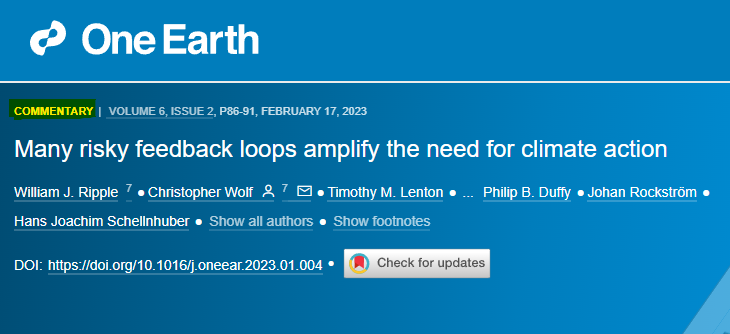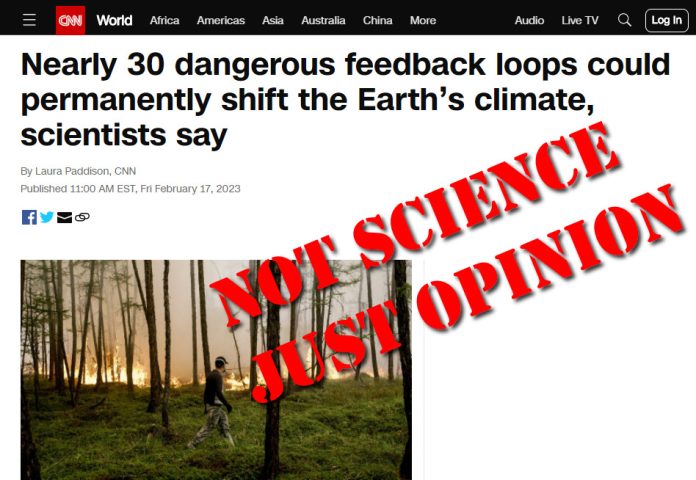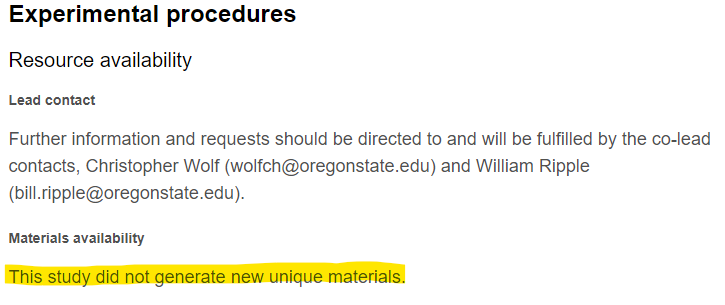An article in CNN claims feedback responses to rising temperatures driven by increasing carbon dioxide concentrations may result in deadly, permanent changes to the Earth’s climate. The article provides no evidence to support this alarming claim, because there is no real-world data to back it up. The only climate tipping points that we can be certain exist are in the climate models themselves. While cosmic and natural cyclical patterns have made dramatic changes on occasion throughout history, there is no evidence carbon dioxide levels have served as a tipping point for such occurrences.
In the CNN article: “Nearly 30 dangerous feedback loops could permanently shift the Earth’s climate, scientists say,” the writer Laura Paddison says, “Dangerous climate feedback loops are increasing global warming and risk causing a permanent shift away from the Earth’s current climate, according to a new study.”
The problem for CNN’s report begins in the title. The source for CNN’s claims is not a “study,” but rather a “commentary,” titled “Many risky feedback loops amplify the need for climate action,” that published in the online-only journal called One-Earth, seen in the screencap below (yellow highlight by the author):
First, “commentary” is just another word for an opinion piece. Opinions are not science. Second, as is confirmed by the publisher in the screencap below, the article didn’t actually do any new science; it produced no new data, no formulas, no methods:
The “commentary” is nothing more than a compilation of what the authors claim is a list of 27 climate feedback loops that will supposedly cause dangerous permanent changes to the Earth’s climate, listed in table 1 of the publication.
In reading the article it becomes clear that it is not a scientific piece, but rather is an advocacy piece. The title itself betrays this fact; “Many risky feedback loops amplify the need for climate action.”
Here are some other examples of advocacy cloaked in science:
A targeted expansion of research and an accelerated reduction of emissions are needed to minimize risks.
…
As we increasingly understand climate change as a series of disasters in the short term and a major threat in the longer term, many governmental jurisdictions and world scientists have declared a climate emergency.
…
Based on our compilation of numerous and potentially risky climate warming feedback loops, we call for immediate concurrent changes to both (1) climate research and (2) climate policy, which should strategically inform and guide each other.
…
Transformative and socially just changes in global energy and transportation, short-lived air pollution, food production, nature preservation, and the international economy, together with population policies based on education and equality, are required to address this immense problem in both the short and the long term.
The entire article is peppered with such call-to-action and “equity” styled language. It is long on action proposals but short on any scientific discussion or defense of the problematic “feedback loops,” the authors claim merit political action. In the place of evidence, the authors commit the logical fallacy of appeals to authority. There are no data, procedures, calculations, and formulas presented to justify claims that dangerous feedback loops exist and that tipping points are pending. Instead, what we have here is an op-ed by some climate advocates.
Concerning the list of “risky feedback loops,” nothing the commentary mentions is new by itself, as these have all been examined by scientists for years, even decades. The list of claimed climate feedback loops include many which have been shown to be non-problems, such ocean circulation, which science can’t even decide whether it is increasing or decreasing in any given decade. Another is sea level rise, which despite wild claims of acceleration, is actually unchanged and steady since 1850. Acceleration is disproved by actual data, and nothing more than an artifact of measurements from different satellite data being combined. The authors also ignore existing data on wildfires to claim that climate change is causing them to be more frequent or severe. The available data clearly refutes this claim. The list goes on and on, as seen in Figure 1 from the One-Earth article.
Figure 1. Map of feedback loops
Finally, the One-Earth “commentary” mentions climate “tipping points” or some variation no less than seventeen times. In the closing summary the authors say, “…if the worst-case risks posed by feedback loops and tipping points have been underestimated, the future of a hospitable planet Earth may be at stake.”
Clearly, the authors think doomsday is on the near horizon. Perhaps they never got the memo that the worst-case climate models, like RCP8.5, have recently been proven to run too hot and are producing “implausibly hot forecasts of future warming.” Many of the worst-case feedback scenarios are based on simulations that only exist in climate models, being impossible to obtain in the real world.
Apparently, CNN missed all of that, thinking that some real, actual science was being done here. CNN promoted the clearly labeled “commentary” as if it were a scientific study. Further, CNN embellished the headline, perhaps to make it more alarming, referencing “nearly 30” dangerous feedback loops, rather than the 27 identified in the One Earth commentary.
This is a shamelessly incompetent piece of so-called journalism on the part of CNN, but sadly, incompetence in journalism today, especially when it comes to climate science, seems to be a feature, rather than a bug.



















